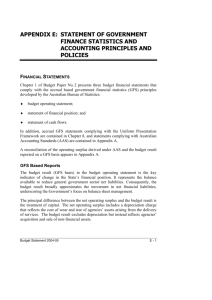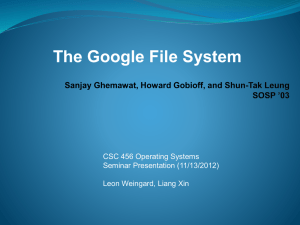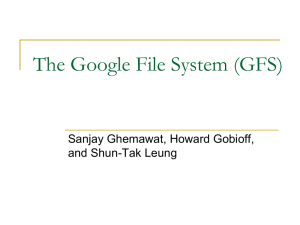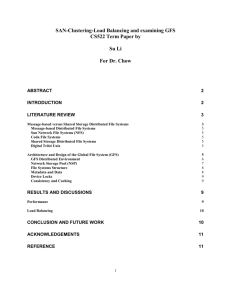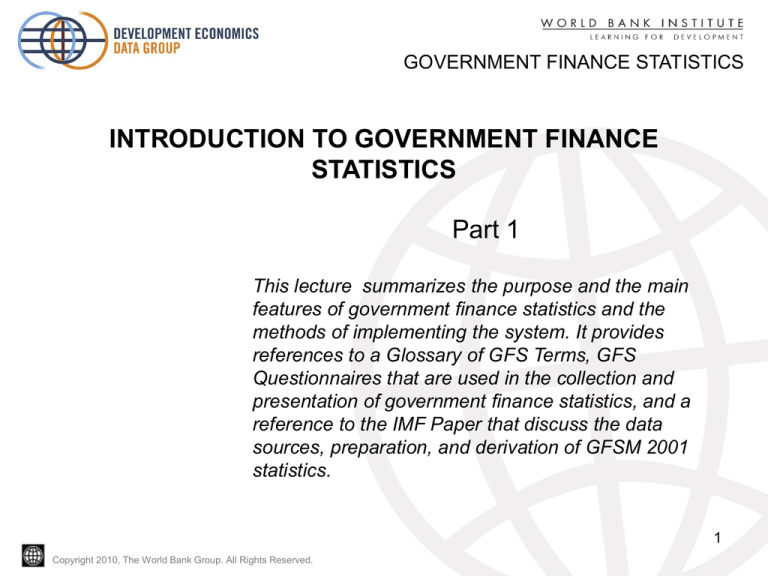
GOVERNMENT FINANCE STATISTICS
INTRODUCTION TO GOVERNMENT FINANCE
STATISTICS
Part 1
This lecture summarizes the purpose and the main
features of government finance statistics and the
methods of implementing the system. It provides
references to a Glossary of GFS Terms, GFS
Questionnaires that are used in the collection and
presentation of government finance statistics, and a
reference to the IMF Paper that discuss the data
sources, preparation, and derivation of GFSM 2001
statistics.
1
Copyright 2010, The World Bank Group. All Rights Reserved.
GOVERNMENT FINANCE STATISTICS
NATURE OF GFS INFORMATION
1
2
3
• Government finance statistics (GFS) measure the financial activities
of the government in an economy.
• The GFS presentation is similar to that of business accounting
where the profit and loss accounts and the balance sheet are
presented together and linked.
• Data presentation emphasizes the economic substance over the
legal form of administrative events. Hence GFS may differ
noticeably from the budget or public accounting reports that appear
in national presentation of government operations.
Copyright 2010, The World Bank Group. All Rights Reserved.
GOVERNMENT FINANCE STATISTICS
INTERNATIONAL STATISTICAL STANDARDS
•
The establishment of an international government finance statistics
standard for fiscal data allows cross-country analysis of government
operations.
•
The concepts, classifications, and definitions employed in the GFS
Manual can be applied to all types of economies.
•
The 2001 GFS Manual has been harmonized with the statistical
standards in the other internationally recognized macroeconomic
statistical systems, namely:
– the overarching System of National Accounts (1993 SNA),
– balance of payments,
– monetary and financial statistics.
3
Copyright 2010, The World Bank Group. All Rights Reserved.
GOVERNMENT FINANCE STATISTICS
GOVERNMENT SECTORS
•
The coverage of government finance statistics is defined in terms of two
major sectors, the general government sector and the public sector, which
are in turn subdivided into several subsectors.
•
The general government sector consists of entities that implement public
policy through the provision of primarily nonmarket services and the
redistribution of income and wealth, with both activities supported mainly
by compulsory levies (such as taxes) on other sectors.
•
The public sector consists of the general government sector plus
government-controlled entities, known as public corporations, whose
primary activity is to engage in commercial activities.
4
Copyright 2010, The World Bank Group. All Rights Reserved.
GOVERNMENT FINANCE STATISTICS
INSTITUTIONAL UNITS
• The general government and public sectors of the 1993 SNA and the GFS
Manual are defined in terms of institutional units that comprise each
sector.
• Institutional units are economic entities that are capable of owning
assets, incurring liabilities, and engaging in economic activities and
transactions with other entities in their own right.
• GFS system covers all entities that materially affect fiscal policies.
5
Copyright 2010, The World Bank Group. All Rights Reserved.
GOVERNMENT FINANCE STATISTICS
DATA FLOWS
• Two types of data flows are recorded in the GFS system:
- transactions, and
- other economic flows.
• Transactions are interactions between two institutional units that take
place by mutual agreement.
• Other economic flows include price changes and other economic events
that affect the holdings of assets and liabilities, such as debt write offs and
catastrophic losses.
6
Copyright 2010, The World Bank Group. All Rights Reserved.
GOVERNMENT FINANCE STATISTICS
GFS REPORTS
• The results of all transactions during an accounting period are recorded in
the Statement of Government Operations.
•The Statement of Sources and Uses of Cash includes the cash
surplus/deficit to indicate the balance of cash flows from government
operations and the net acquisition of nonfinancial assets.
• The results of all other economic flows are recorded in the Statement of
Other Economic Flows.
• The stock of all financial and nonfinancial assets and liabilities at the end
of the accounting period is recorded in the Balance Sheet.
• The comprehensive treatment of all transactions and other economic
flows in the GFS system means that the opening and the closing balance
sheets can be reconciled.
7
Copyright 2010, The World Bank Group. All Rights Reserved.
GOVERNMENT FINANCE STATISTICS
USES OF GFS
• The various flows and stocks are classified in the GFS system according to
their economic nature and policy purpose.
•The GFS system is designed to provide information that enable
policymakers and analysts to study developments in the financial operations,
financial position, and liquidity and sustainability situation of the general
government sector or the public sector operations.
• GFS analytic framework can be used to analyze the operations of a
specific level of government and transactions between levels of government
as well as the entire general government or public sector.
• Information on government outlays classified using the Classification of
the Functions of Government (COFOG) has a variety of analytical uses.
8
Copyright 2010, The World Bank Group. All Rights Reserved.
GOVERNMENT FINANCE STATISTICS
USES OF GFS
• GFS is a statistical time series information system.
• Most analyses using GFS involve comparisons of data compiled on a
consistent basis over many periods.
• GFS aggregates are usually compared over time by reference to measures
of the country’s gross domestic product.
9
Copyright 2010, The World Bank Group. All Rights Reserved.
GOVERNMENT FINANCE STATISTICS
IMPLEMENTATION OF GFS
• Some countries may be able, at least initially, to compile only a small part
of the GFS system.
• Implementation of the fully integrated GFS system will take some time and
will need to progress at a pace determined by the differing needs and
circumstances of the country involved.
• A possible first step on the migration path could be that countries adopt
the classification structure of the GFS system.
• The next priority might be to adjust their existing cash-based statistics to
allow for known deficiencies, such as by incorporating information on
revenue or expense arrears.
• A further step might be the assembly of balance sheet information on
financial assets and liabilities.
10
Copyright 2010, The World Bank Group. All Rights Reserved.
GOVERNMENT FINANCE STATISTICS
• A staged implementation using selected sectors and institutional units as a
pilot is recommended.
• The pilot project for the introduction of GFS methodology should run in
parallel with the existing fiscal system for several reporting periods.
• Migration strategy should recognize a three stage approach:
- presentation,
- reporting, and
- implementation
11
Copyright 2010, The World Bank Group. All Rights Reserved.
GOVERNMENT FINANCE STATISTICS
REFERENCES
Glossary of GFS Terms can be found at:
http://www.imf.org/external/pubs/ft/gfs/manual/pdf/gloss.pdf
Paper on Data Sources, Preparation, and Derivation of GFSM 2001 Statistics
can be found at:
http://www.imf.org/external/pubs/ft/gfs/manual/gfsm01Select.pdf
The GFS Yearbook Questionnaire used in collection and presentation of
government finance statistics data can be found at:
http://www.imf.org/external/pubs/ft/gfs/manual/2010/gfsyq.pdf
Guidelines and instructions for responding to the GFS Yearbook
Questionnaire can be found at:
http://www.imf.org/external/pubs/ft/gfs/manual/qins.pdf
Guidelines and instructions for responding to the GFS High-Frequency
Questionnaire can be found at:
http://www.imf.org/external/pubs/ft/gfs/manual/2010/gfshf.pdf
Copyright 2010, The World Bank Group. All Rights Reserved.
12

